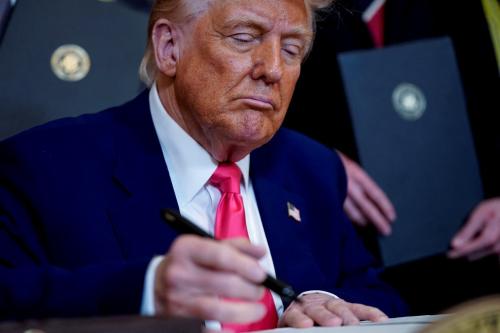In his speech this week commemorating the July 23rd 1952 revolution President El-Sisi stated: “all my appreciation, gratitude and respect for Egyptians’ reaction to the cut in energy subsidies and the reduction in the budget deficit. It is a harsh policy measure but a necessary one and the government is trying to protect the poor.
Egypt’s Hard Economic Choices
Mr. El-Sisi is right to praise his people. So far Egyptians have shown tremendous resilience and understanding of political and economic imperatives. But it is not clear how long this will last nor how much more hardship they will accept. Therefore, the government should consider moving quickly to put in place an efficient social protection system to cushion the impact of ongoing and future economic reforms on the poor and the middle class.
Egypt’s budget for the fiscal year starting July 1, 2014 includes significant cuts in energy subsidies. As a result, petrol prices rose by 78 percent, diesel rose by 64 percent and natural gas prices rose by 175 percent. The government also started implementing electricity price increases that aim to double electricity prices over a five year period. In fact, additional price increases are to be expected in the coming years, because the government will continue to pay out energy subsidies of some 100 billion Egyptian pounds (about 14 billion US dollars) a year even after the most recent price increases, which is probably not sustainable.
Reducing energy subsidies is a step in the right direction, and it demonstrates the new administration’s ability to make hard choices. It is a step that should have been taken many years back. However, past governments lacked the political courage required to adopt such a potentially unpopular policy. The El-Sisi administration has so far succeeded in avoiding a popular backlash in part by arguing that it has no other choice if it is to avoid a serious macro-economic crisis.
It is true that the government has limited options. The budget deficit has reached nearly 14 percent of GDP in the fiscal year ending June 30th and the public debt is almost 90 percent of GDP. Price subsidies are slightly less than 9 percent of GDP, or more than one-quarter of total government spending. Energy subsidies alone are close to 7 percent of GDP. It is hard to see how Egypt can avoid macro-economic collapse without reducing, or even eliminating, those subsidies.
Toward a New Social Contract
But crises can also give rise to opportunities. It may be time for Egypt to overhaul its archaic safety net system and develop a new social contract that reflects the realities of the 21st century.
Over the last two decades many middle-income countries (e.g. Brazil and Mexico) shifted to social protection systems based on targeted cash transfers, but Egypt maintained its system based on generalized price subsidies. This is the system adopted by President Nasser more than 50 years ago, and it involves subsidizing prices of a number of commodities (including fuel, electricity, bread, rice, edible oil, tea and sugar).
Generalized price subsidies are part of what has come to be known as the autocratic bargain or the autocratic social contract. This included free health and education, government jobs for all graduates and low prices for necessities, but limited political and civil liberties. The January 2011 revolution and the fall of President Mubarak demonstrated the limits of that arrangement, and highlighted the need for developing a new social contract—a contract which is consistent with a market economy and which responds to youth demands for freedom, dignity and social justice.
Social protection based on generalized price subsidies may (or may not) have worked in the 1960s, but it is certainly not working now. In addition to their high budgetary cost, price subsidies fail to target those who really need them. For example, the poorest 40 percent of the population receive only 3 percent of the subsidy on gasoline, 7 percent of the subsidy on natural gas and 10 percent of diesel subsidies. Moreover, they encourage over-consumption of the subsidized goods. Egypt’s economy has thus become more energy intensive than most advanced country economies, with negative consequences for economic efficiency and environmental sustainability.
This does not mean, however, that the poor and the middle class are not being hurt by the subsidy removal. They are affected in at least two ways. First, prices of most goods will rise because of the increase in transport costs. Already taxi fares in Cairo have risen by about 50 percent. Second, industry (especially energy intensive industries like iron and steel, cement, pharmaceuticals and fertilizers) will see their costs rise which may affect their ability to expand and hire new workers, unless they are able to pass on cost increases to consumers. Again, the poor and middle class are bound to be impacted.
The government is aware of those potential impacts and of the associated political risks. It is trying to protect the poor from price increases, but it is not clear that its efforts will be effective. Government is increasing its surveillance of markets to ensure that there is no “unreasonable” increase in prices. However, experiences from around the world indicate that when governments try to intervene to fix prices they make matters worse, because they create shortages and encourage the development of a black market. The Government has also announced that about 69 million people who hold ration cards will have access to 20 subsidized consumption items. That may be a good short-term solution. However, Egypt’s own experience indicates that subsidizing consumption goods is almost always associated with waste, leakage and corruption. And, already people are grumbling that some of the subsidized goods are missing from shelves.
The idea of putting in place a social protection system based on targeted cash transfers has been studied in Egypt for several years, and could be quickly implemented. Experience from around the world indicates that such a system is much less expensive, more efficient and fairer than price subsidies. The Egyptian government should consider moving ahead quickly to put such a system in place. It makes economic as well as political sense. It would be one way of responding to demands for greater social justice, and would make implementation of future reforms and further subsidy reductions much easier.
The Brookings Institution is committed to quality, independence, and impact.
We are supported by a diverse array of funders. In line with our values and policies, each Brookings publication represents the sole views of its author(s).



Commentary
Egypt Needs a New Social Protection System
July 25, 2014